Keeping a few chickens in the back yard really is quite straight forward; however there are some things to consider in order to get the right sort of birds for your situation and to keep them in the best possible health to get the most enjoyment out of keeping them.
This page hopes to get you thinking about the types of chickens and their requirements.
Choosing a breed
There are quite literally hundreds of different breeds of chicken to choose from and out of these, many have slightly different requirements.
Some breeds of chicken come only as Large Fowl, and others are also available as Bantams which are a smaller version that look the same. The Orpington for example is available in both large and bantam sizes but the Cochin is only available as large fowl.
There are a handful of ‘True Bantams’ where there is no large fowl equivalent. Examples of these are Dutch Bantams, Japanese Bantams and the popular Pekin Bantam.
Bantams tend to be quite flighty whereas the heavy breeds of large fowl often cannot fly more than a few inches off the ground. Orpingtons for example won’t usually roost very high due to their huge size and will usually just huddle on the floor of the coop.
Every breed is slightly different in the amount of eggs they lay. Typically hens that have been bred for exhibition purposes do not lay as well as utility hens. Bantams of course lay smaller eggs which some people say they prefer for taste.
Hybrids
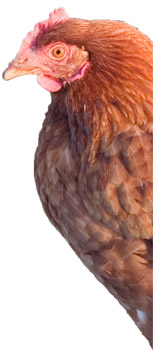 Hybrids are chickens that have been created by crossing pure breeds. They are typically crossed to make good layers (the hybrid to the right can lay 280 to 300 eggs!), coloured eggs or attractive hens. Some can be very attractive and they are all generally very hardy. Hybrids are produced in larger numbers that pure breeds and most of the crosses used make the males a different colour as day old chicks so that only females can be raised, therefore reducing costs by about half. A typical hybrid hen will cost you around £15 compare to £25 to £30 for a typical pure breed hen.
Hybrids are chickens that have been created by crossing pure breeds. They are typically crossed to make good layers (the hybrid to the right can lay 280 to 300 eggs!), coloured eggs or attractive hens. Some can be very attractive and they are all generally very hardy. Hybrids are produced in larger numbers that pure breeds and most of the crosses used make the males a different colour as day old chicks so that only females can be raised, therefore reducing costs by about half. A typical hybrid hen will cost you around £15 compare to £25 to £30 for a typical pure breed hen.
Hybrids are a good choice if eggs are one of your priorities although if you think you might like to hatch some eggs, remember hybrid hens do not breed true – you would need the original pure breeds to cross again in order to create more of the same thing so whilst you can hatch their eggs, you may want to consider a few pure breeds for this purpose or consider buying in eggs to hatch.
Free Range
You will of course need a chicken coop but also a secure run or area that is predator proof. A question that people always ask me is “How big should their run be?” I always say “as big as possible within reason.” Even 2 chickens kept in a 2 meter run will soon turn it to mud and get bored (which can introduce vices such as feather pecking and egg eating) but I always believe that it’s fine to provide a small run like this if you can let them out for a few hours each day to free range while you are around. This will give them a chance to forage, supplement their diet and reduce boredom.
Once chickens have settled into their new house, they will go back to it to roost every night so you can let them out in the late afternoon, knowing they will come back to roost at night keeping everyone happy! Some houses and runs have handles or wheels that make them easy to move onto fresh ground which is not only good to prevent a build up of worm eggs and disease but also provides them with a little fresh grass to graze.
Keeping Chickens in the Garden
If you have a ‘nice’ garden that you don’t want spoilt, it’s usually a sensible idea to limit their foraging. Chickens scratch at the ground, make dust baths in the dry soil, leave muck wherever they go and destroy tender young plants. If you can plant in pots, this will help and fencing off part of the garden is usually a good choice to keep them out if you have tender or precious plants. Chickens with feathered feet scratch less and bantams can clear a 6 foot fence if they want to. Heavy breeds of large fowl can be kept out with a knee high fence or box hedge. If you want to stop a bird from flying then you can clip one wing (not both).
So you have decided on the breed that’s right for you and your circumstances. Next, you will need to think about keeping them secure from predators in a suitable chicken house and chicken run – click on a link to go to that page!


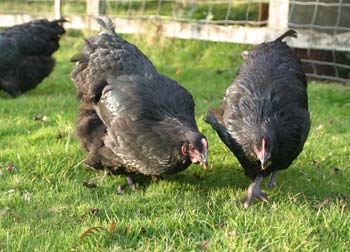
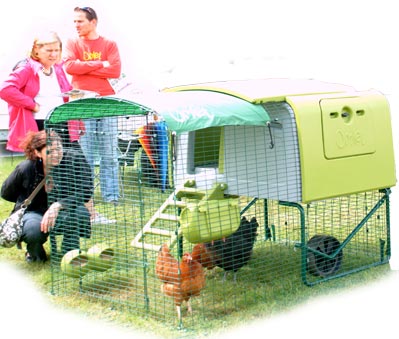
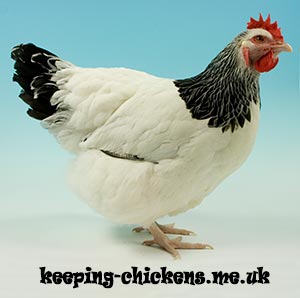
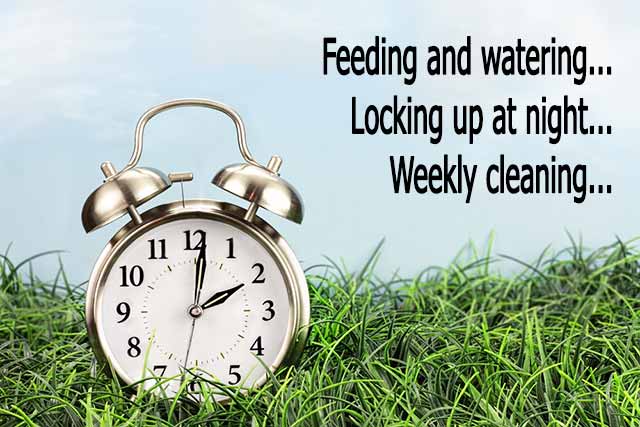

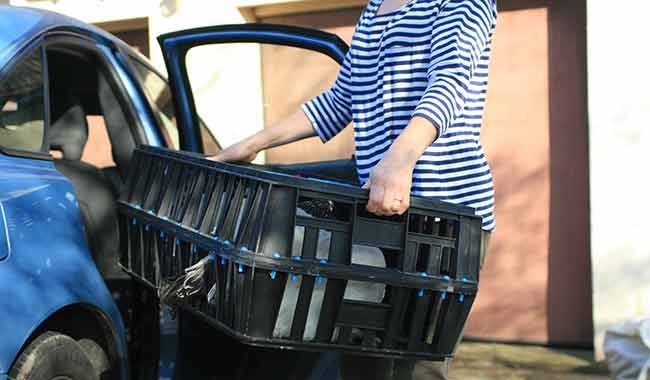
Hi, we are planning on getting some chicks next month and wondered if there was a particular heat lamp you’d recommend? We are planning on keeping them in our summer house temporarily whilst we build the coop and run. Thank you.
Not particularly, but I would suggest you get a couple of different power dull emitter bulbs.
I use 250W during the first few weeks, then drop it to 100W after that. It saves some electric.
Dull emitters don’t generally fail and will last a very long time (unless dropped of course). They are more expensive to purchase but in the long run, I much prefer them.
Hi there. I’m considering getting chickens. I have a descent size garden but live in London so houses are on top of each other. Would having chickens be selfish to the neighbours? I can imagine they will complain if they start seeing rats and mice!
It can be done, but with hens (not a cockerel) and starting off with just 2-3 hens.
Everyone associates rats and mice with chickens, but it’s their food and water that attracts them, not the chickens themselves.
If you keep their food in a feed bin (eg dustbin) and the food in the run is secure/covered then vermin shouldn’t get to it. If you see signs of vermin (eg they dig under the run) then you should take extra precautions of removing the feed and water at night. You should also have a preventative vermin strategy in place (eg bait boxes/traps in place) then if neighbours say about vermin you can tell them this.
I would talk to your closest neighbours about the chickens beforehand to get their support (the offer of a few eggs usually works!)
Hi I am planning on buying 2/3 hens i have already bought a coop and run, could somebody tell me the following:
What bread would be suitable I want small/ medium birds?
What do i put on the floor of the run?
What do I put in side the coop box?
What food, disinfectants etc do I need to keep the birds in healthy condition
Any other information you guys feel relevant would be hugely appreciated.
Thanks
Hi, I’ve spent the best part of today reading your site and making notes… so informative – thank you! I am hoping to starting keeping chickens. I’m hoping to take on 3 or 4 ex-battery hens. I’m not really looking for the eggs but if they come after while that’ll be a bonus. If they are ex-battery, will they have their wings clipped already? I’d love to let them roam feely round my secure garden.
thank you.
I’m pleased you like it.
Normally ex-battery hens aren’t in a great state for flying. They haven’t had the freedom to flap their wings much before.
Usually, they will be unfit and unable to fly and their feathers may be in poor condition.
This type of hybrid hen doesn’t often fly. It’s the Mediterranean light breeds that are flighty. Leghorns and hybrids of those are an example.
I would see how they get on before clipping a wing.